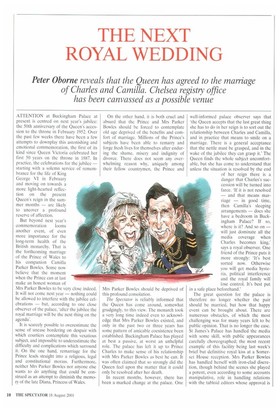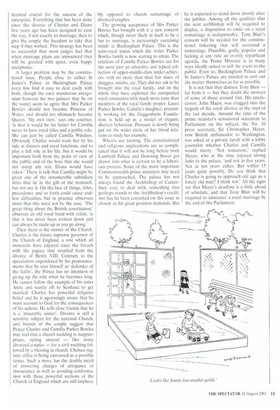THE NEXT ROYAL WEDDING
Peter °borne reveals that the Queen has agreed to the marriage
of Charles and Camilla. Chelsea registry office has been canvassed as a possible venue
l'ENTION at Buckingham Palace at present is centred on next year's jubilee: the 50th anniversary of the Queen's accession to the throne in February 1952. Over the past few weeks there have been a few attempts to downplay this astonishing and emotional commemoration, the first of its kind since Queen Victoria celebrated her first 50 years on the throne in 1887. In practice, the celebrations for the jubilee — starting with a solemn service of remembrance for the life of King George VI in February and moving on towards a more light-hearted reflection on the present Queen's reign in the summer months — are likely to uncover a profound reserve of affection.
But beyond next year's commemoration looms another event, of even more importance for the long-term health of the British monarchy. That is the forthcoming marriage of the Prince of Wales to his companion Camilla Parker Bowles. Some now believe that the moment when the Prince can at last make an honest woman of Mrs Parker Bowles to be very close indeed. It will not come next year — nothing could be allowed to interfere with the jubilee celebrations — but, according to one close observer of the palace, 'after the jubilee the royal marriage will be the next thing on the agenda'.
It is scarcely possible to overestimate the sense of unease bordering on despair with which courtiers contemplate this vexatious subject, and impossible to underestimate the difficulty and complications which surround it. On the one hand, remarriage for the Prince leads straight into a religious, legal and constitutional morass. Furthermore, neither Mrs Parker Bowles nor anyone else wants to do anything that could be construed as an attempt to diminish the memory of the late Diana, Princess of Wales. On the other hand, it is both cruel and absurd that the Prince and Mrs Parker Bowles should be forced to contemplate old age deprived of the benefits and comfort of marriage. Millions of the Prince's subjects have been able to remarry and forge fresh lives for themselves after enduring the shame, misery and indignity of divorce. There does not seem any overwhelming reason why, uniquely among their fellow countrymen, the Prince and Mrs Parker Bowles should be deprived of this profound consolation.
The Spectator is reliably informed that the Queen has come around, somewhat grudgingly, to this view. The monarch took a very long time indeed even to acknowledge that Mrs Parker Bowles existed, and only in the past two or three years has some pattern of amicable coexistence been established. Buckingham Palace has played at best a passive, at worst an unhelpful role. The palace has left it up to Prince Charles to make sense of his relationship with Mrs Parker Bowles as best he can. It was often claimed that so strongly did the Queen feel upon the matter that it could only be resolved after her death.
In recent months, however, there has been a marked change at the palace. One well-informed palace observer says that 'the Queen accepts that the last great thing she has to do in her reign is to sort out the relationship between Charles and Camilla, and in practice that means to smile on a marriage. There is a general acceptance that the nettle must be grasped, and in the wake of the jubilee they can grasp it.' The Queen finds the whole subject uncomfortable, but she has come to understand that unless the situation is resolved by the end of her reign there is a danger that Charles's succession will be turned into farce. 'If it is not resolved — and that means marriage — in good time, then Camilla's sleeping arrangements — does she have a bedroom in Buckingham Palace? If so, where is it? And so on — will just dominate all the media coverage when Charles becomes king,' says a royal observer. One friend of the Prince puts it more strongly: 'It's best sorted now. Otherwise you will get media hysteria, political interference and the royal family will lose control. It's best put in a safe place beforehand.'
The great question for the palace is therefore no longer whether the pair should be married, but how that happy event can be brought about. There are numerous obstacles, of which the most challenging was for many years felt to be public opinion. That is no longer the case. St James's Palace has handled the media with some skill, with public appearances carefully choreographed; the most recent example of this facility being last week's brief but definitive royal kiss at a Somerset House reception. Mrs Parker Bowles has handled herself with iron-clad discretion, though behind the scenes she played a potent, even according to some accounts manipulative, role in handling relations with the tabloid editors whose approval is deemed crucial for the success of the enterprise. Everything that has been done since the divorce of Charles and Diana five years ago has been designed to ease the way, if not exactly to marriage; then to give the couple the freedom to take that step if they wished. This strategy has been so successful that most judges feel that when marriage plans are announced they will be greeted with quiet, even happy acceptance.
A larger problem may be the constitutional issue. People close to either St James's Palace or Buckingham Palace (very few find it easy to deal easily with both, though the once murderous antagonism between the two palaces may be on the wane) seem to agree that Mrs Parker Bowles should not become Princess of Wales. and should not ultimately become Queen. 'My own view,' says one courtier, 'is that it would be far better for Camilla never to have royal titles and a public role. She can just be called Camilla Windsor. Obviously Charles would want her by his side at dinners and royal functions, and to play a full role in his life, but it would be important both from the point of view of the public and of the boys that she would not usurp any role Diana would have taken.' There is talk that Camilla might be given one of the innumerable subsidiary titles that lie in the gift of the monarch, but not use it. On the face of things, titles. precedence and so forth could cause endless difficulties, but in practice observers insist that this need not be the case. 'The great thing about the British constitution,' observes an old royal hand with relish, is that it has never been written down and can always be made up as you go along.'
Then there is the matter of the Church. Charles is the future supreme governor of the Church of England, a role which all monarchs have enjoyed since the breach with the papacy that resulted from the divorce of Henry VIII. Contrary to the speculation engendered by his pronouncements that he sees himself as 'defender of the faiths'. the Prince has no intention of giving up the role when he becomes king. He cannot follow the example of his sister Anne and scuttle off to Scotland to get married. Charles has powerful religious belief and he is agonisingly aware that he must account to God for the consequences of his actions. He tells close friends that he is a 'miserable sinner'. Divorce is still a sensitive subject for the national Church, and friends of the couple suggest that Prince Charles and Camilla Parker Bowles may feel that a church wedding is inappropriate, opting instead — like many divorced couples — for a civil wedding followed by a blessing in church. Chelsea registry office is being canvassed as a possible venue. Such a move has the double merit of answering charges of arrogance or insouciance as well as avoiding confrontation with those powerful sections of the Church of England which are still implaca
bly opposed to church remarriage of divorced couples.
The growing acceptance of Mrs Parker Bowles has brought with it a new concern which, though never likely in itself to be a bar to marriage, is increasingly exercising minds at Buckingham Palace. This is the semi-royal status which the wider Parker Bowles family is now starting to attain. The relations of Camilla Parker Bowles are for the most part an attractive and typical collection of upper-middle-class under-achievers, with no more than their fair share of druggies, misfits, etc. They did not ask to be brought into the royal family, and on the whole they have exploited the unexpected royal connection with much more taste than members of the royal family proper. Laura Parker Bowles, Camilla's daughter, presently working for the Guggenheim Foundation, is held up as a model of elegant, discreet behaviour. Pressure is slowly being put on the wider circle of her blood relations to study her example.
Wheels are turning. The constitutional and religious implications are so complicated that it will not be long before both Lambeth Palace and Downing Street get drawn into what is certain to be a laborious process. Some of the more important Commonwealth prime ministers may need to be approached. The palace has not always found the Archbishop of Canterbury easy to deal with, something that perhaps stands to the Archbishop's credit; nor has he been consulted on this issue as closely as his great position demands. But he is expected to stand down shortly after the jubilee. Among all the qualities that the next archbishop will be required to display, a disposition to smile on a royal remarriage is indispensable. Tony Blair's consent will be needed for the constitutional tinkering that will surround a remarriage. Plausible, godly, popular and lacking at any rate an overtly republican agenda, the Prime Minister is in many ways ideally suited to sell the event to the public. Even so, Buckingham Palace and St James's Palace are minded to sort out the matter themselves as far as possible.
It is not that they distrust Tony Blair — far from it — but they doubt the motives of some of those around him. His predecessor, John Major, was dragged into the tragedy of the royal divorce at the start of the last decade. Around the time of the prime minister's sensational statement to Parliament on the subject, the No. 10 press secretary, Sir Christopher Meyer, now British ambassador to Washington, was asked at a private lunch with a lobby journalist whether Charles and Camilla would marry. Not tomorrow,' replied Meyer, who at the time enjoyed strong links to the palace, 'and not in five years. Not in ten years either. But within 15 years quite possibly. Do you think that Charles is going to approach old age as a lonely old man? I think not.' All the signs are that Meyer's deadline is a little ahead of schedule, and that Tony Blair will be required to announce a royal marriage by the end of this Parliament.



























































 Previous page
Previous page